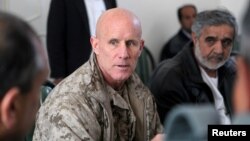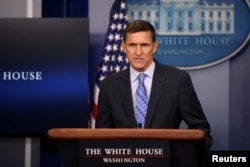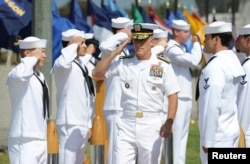Vice Admiral Robert Harward, the man reported to be U.S. President Donald Trump’s choice to replace his ousted national security adviser, is a former Navy SEAL who went to high school in Iran and speaks fluent Farsi.
Harward is well-respected in the national security community. He has close ties with Defense Secretary Jim Mattis. They served together during Harward's time as deputy commander of Central Command, which oversees U.S. forces in the Middle East.
The 60-year-old Harward, who retired from the military in 2013, is currently working as an executive at Lockheed Martin, the weapons and aerospace company, where he focuses on the United Arab Emirates.
The White House has not publicly announced his appointment, nor is it known whether he has accepted the position, which is not subject to Senate confirmation.
If confirmed, Harward would replace retired General Michael Flynn, who left his post this week after misleading White House officials about his contact with Russian officials during the presidential transition period.
Michael Flynn resignation
Flynn’s tenure as national security adviser was the shortest ever — less than one month — and the outspoken general provoked strong partisan sentiment in Washington.
Harward, on the other hand, is respected on both sides of the political spectrum.
"As far as I know there's not a political bone in Admiral Harward," said Tom Spoehr, a retired three-star Army general who is now the director of the Center for National Defense at the conservative Heritage Foundation.
Spoehr said Harward is a "fairly distinct" opposite from Flynn, who got involved early in Trump's presidential campaign.
"Harward is not a personality. He's not a celebrity. I don't think you could find him making a statement on either side of the political spectrum," he added.
Bill Danvers, a senior fellow at the left-leaning Center for American Progress, agrees that Harward has a reputation as a "warrior and a patriot."
"It's potentially a very good move," he said.
Harward spent his formative high school years in Iran before the 1979 Islamic revolution that ousted the pro-American shah. His father was a U.S. Navy captain, who advised the Iranian military.
As national security adviser, he would be responsible for helping the president coordinate policy on Iran’s nuclear and missile programs, as well as responding to Tehran’s growing regional influence.
Harward has previous experience serving in the White House. He worked in the National Security Council under former President George W. Bush, where he focused on counterterrorism.
Though his reported appointment could bring a measure of stability to a White House racked with divisions, Danvers stresses that ultimately U.S. foreign policy will depend on the president, not the national security adviser.
"The president set the tone, he sets the parameters of the policy, and sometimes sets the policy," he said. "It really does begin and end with the president."






